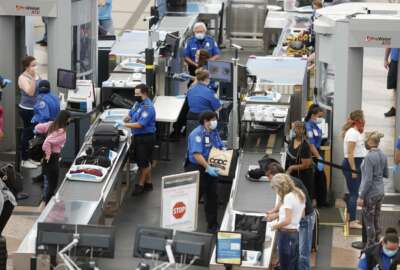To listen to the Federal Newscast on your phone or mobile device, subscribe on PodcastOne or iTunes.
- A House rep wants the Secret Service to stop giving money to Trump owned businesses. Rep. Adam Schiff (D-Calif.) announced he’s introducing an amendment to a major funding bill, which prohibits the payment of Secret Service funds to entities owned by the president or his immediate family. Schiff cited the massive costs the agency has had to pay due to the frequent trips the president and his family make to Trump businesses. The Government Accountability Office estimates each visit to a Trump Organization location by the president and his family costs around $3 million. (Rep. Adam Schiff)
- More details on how the GSA’s inspector general will conduct its reviews of the agency’s lease with the Trump Hotel. Former Deputy IG for the Homeland Security Department Jim Taylor said an IG review is different than an audit. It’s faster and more flexible, and focuses on how a decision was made. In this case, it’s the decision that President Trump is not in violation of his lease with the General Services Administration. (Federal News Radio)
- Lawmakers want to see some of the reports developed under the recent cyber executive order. The day after the State Department confirmed it would merge its cyber coordinator office with its Bureau of Economic and Business Affairs, two senators want more details on how State and four other agencies are addressing international cybersecurity priorities. Sen. Ron Johnson (R-Wis.) and Claire McCaskill (D-Mo.) wrote to the secretaries of State, Defense, Homeland Security, Treasury and Commerce seeking a copy of the report they sent to the White House in June. Under the cybersecurity executive order issued in May, agencies were supposed to detail how they are addressing international cyber challenges such as attribution, threat sharing and capacity building. (Senate Homeland Security and Governmental Affairs Committee)
- The Office of Personnel Management wants to know what federal employees think of their benefits. The agency will administer the Federal Employee Benefits Survey this year to a sample of 40,000 government workers via email. The goal is to measure whether feds think available benefits match their needs. OPM last administered the survey back in 2015. (Chief Human Capital Officers Council)
- OPM approved a special solicitation to let agencies collect donations to support Harvey survivors. Agencies can administer donation drives and collect cash or checks outside of the typical Combined Federal Campaign. The solicitation ends Sept. 29. OPM Acting Director Kathleen McGettigan said federal employees had expressed an interest in being able to collect donations for survivors in Texas. (Office of Personnel Management)
- Over 1,000 Surge Capacity Force volunteers with the Homeland Security Department are being trained to be deployed this week and next. DHS’ corps of volunteer non-FEMA employees will help with Tropical Storm Harvey rescue and response. DHS employees can apply to be part of the Surge Force on the department’s intranet. (Federal News Radio)
- The Air Force has sent more support to Houston to help with the aftermath of Harvey. Two HC-130J Combat King-IIs, three HH-60G Pave Hawks, along with 120 personnel to operate them are headed to Texas. The service also sent in two C-17 Globemasters carrying supplies to Louisiana.
- The Army has laid out its best industry partners in this year’s Superior Supplier Incentive Program. It uses the SSIP to rate contractors who perform well in the areas of cost, schedule, management, and regulatory compliance. Higher rated contractors get more chances to interact with contracting officials. Making up most of tier 1 this year are subsidiaries of Boeing, Lockheed Martin, Raytheon, and Northrop Gruman. (Army)
- The Navy’s top officer said there’s no evidence that either of the service’s recent collisions in the Asia-Pacific region were caused by cyber attacks. Adm. John Richardson, the chief of naval operations, said all of the Navy’s investigations into accidents and incidents have to take cyber and information warfare into account. But he told a Facebook town hall yesterday that despite having paid what he said was an “amazing amount of attention” to the cyber issue in the early days of the investigations, there’s still no indication that cyber attacks played any role in the collisions involving the U.S.S. John McCain and the U.S.S. Fitzgerald. (Navy)
Copyright
© 2024 Federal News Network. All rights reserved. This website is not intended for users located within the European Economic Area.





